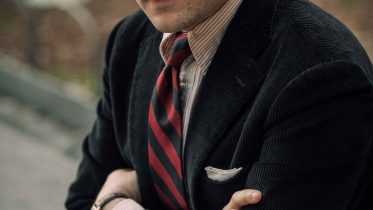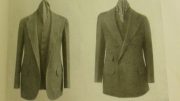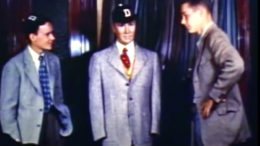1920s-’40s
Double Breasted Blazers ARE Ivy If You Do Them Right
The Buck Starts Here.
Jazz Goes to College: Jazz and Ivy Style at Mid-Century
Ivy Notes S1 E4 – G. Bruce Boyer Corrects Me, A Brief History Of Abercrombie & Fitch, and The Great Alpacuna Debate
The Ivy-Style Playlist Update
Bathing Suit: Joseph Haspel Goes Swimming In Seersucker, 1946
Macy’s Knows Its Yale, 1941
True University Style: Kuppenheimer, 1928
Hanover Hangover: A Selection Of Vintage Dartmouth Videos
Yesterday Richard Press opined on his days at Dartmouth among “college guys with bloody bloodshot eyes,” and today we offer a hangover cure in the form of videos from the heyday of the Ivy League Look. You could call it a hair of the bulldog, except that’s Yale.
So This Is College, 1929
One of most interesting aspects of the Ivy League Look is that while it campus dress was extremely formal in relation to that of today, it was relatively casual in relation to off-campus dress of the time. Historian Deidre Clemente has shown how college kids invented the very concept of being dressed-down in her book …
Sailing New Seas: Brooks Brothers In Newport & Palm Beach
Brooks Brothers’ bankruptcy is fueled in part by having too many retail stores in nearly every corner of the globe. But there was a time when the brand maintained a presence in only two places outside of New York. And these were not in other bastions of the eastern establishment, such as Boston, Philadelphia or …
Was There Something I Missed?
In 2013 the Yale Alumni Magazine ran a short but interesting essay showing the importance of “the right clothes” and the ignorance of it for many public school kids admitted in the postwar years. Writes Marty Nichols, who went off to New Haven in the fall of 1948: As my classmates and I converge on …
School’s Out: Daily Princetonian Seersucker Ads, 1940s
If you were off on Spring Break or spending the winter in Palm Beach, Princeton’s clothiers of the 1940s had just the clothes you needed, including plenty of seersucker. While not graphically interesting, these ads include interesting copy revealing what was popular with students at the time.
Big Man On Campus
It would be an understatement to say F. Scott Fitzgerald was an arbiter of the Ivy League Look. A former student at Princeton who, having become absorbed in writing dropped out to write several critically acclaimed books, Fitzgerald helped chronicle the Jazz Age and the clothing styles that came to define it. Though Fitzgerald was …
Gommy, Forgotten Campus Shop of Penn and Princeton
Recently I purchased a 1926 yearbook for my alma mater, the University of Pennsylvania, and was pleasantly surprised to see a Brooks Brothers advertisement on the first page of the ad section. Flipping through, I also discovered ads for a few local establishments, including a campus menswear shop called Gommy. It seemed like Gommy may …
The Princeton J. Press Wartime Blackout Riot
As Richard Press has written here, J. Press’ Princeton store didn’t last long after Pearl Harbor. It was still around in April of 1942, however, when Princeton held a wartime blackout. The idea was to practice turning off all lights so that if there were an enemy bomber, they wouldn’t have anything to aim at. …
Princeton Crew, 1948-50
This is a 20-minute clip, so watch it over lunch if you’re the kind of schlub who eats lunch at his desk. And if you’re at home, pour yourself a drink and get comfortable. Love the towel worn as a scarf in the opening. Great chinos and sweaters in action at 2:28. Jackets and ties …
Don’t Call It Collegiate: Apparel Arts, 1933
I found this post sitting on Ivy Style’s server, never published. The only note is that it dates from a 1933 issue of Apparel Arts. * * * The word “collegiate,” now seldom used in speaking of college men, is altogether foreign to its famous meaning of some eight years ago, when the raccoon coat, …





















